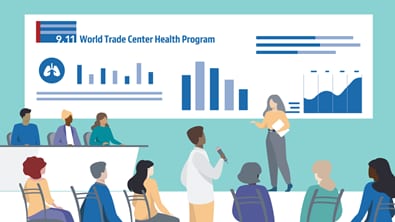Key points
- NIOSH funds research of the 9/11-exposed population to provide improved healthcare.
- There are four funding opportunities for FY25: three exploratory/developmental (R21), and one research career development (K01).

Background
NIOSH funds research of the 9/11-exposed population as part of the World Trade Center (WTC) Health Program. This research fortifies our understanding of 9/11 health effects. Research also provides a pathway to improved healthcare for people afflicted from 9/11 exposure. NIOSH offers four funding opportunities.
Funding by category
The purpose is to help address Zadroga Act research mandate by soliciting scientifically rigorous applications to answer critical clinical questions about:
- Physical and mental health conditions that may be related to the September 11, 2001, terrorist attacks;
- Diagnosing WTC-related health conditions for which there has been diagnostic uncertainty; and
- Treating WTC-related health conditions for which there has been treatment uncertainty.
U01 projects involve longer term research, and as a cooperative agreement, there will be substantial federal scientific or programmatic involvement.
NIOSH supports exploratory and developmental research projects (R21) that address diagnostic or treatment uncertainty with respect to individuals receiving monitoring and/or treatment under subtitle C of the James Zadroga 9/11 Health and Compensation Act of 2010 as amended.
It provides support for the early and conceptual stages of project development. The research should provide innovative approaches, interventions, techniques, or methods to improve treatment and diagnostic effectiveness through intervention, and support program evaluation.
The mentored career development grant is intended to prepare the next generation of investigators to conduct WTC-related health research. Recipients receive 75% "protected time" for up to 3 years for supervised (mentored) WTC-related health research.
Ongoing funding opportunities
The announcements listed below are published in the NIH Guide to Grants and Contracts. Each announcement specifies the type of grant activity supported and information needed to submit a grant application.
Previous funding opportunities
These funding announcements have expired and been reissued. The links are included here as a reference.
Resources
The WTC Health Program research webpage provides comprehensive information and tools for researchers. It includes the research agenda, publication library, and funding dashboard.
